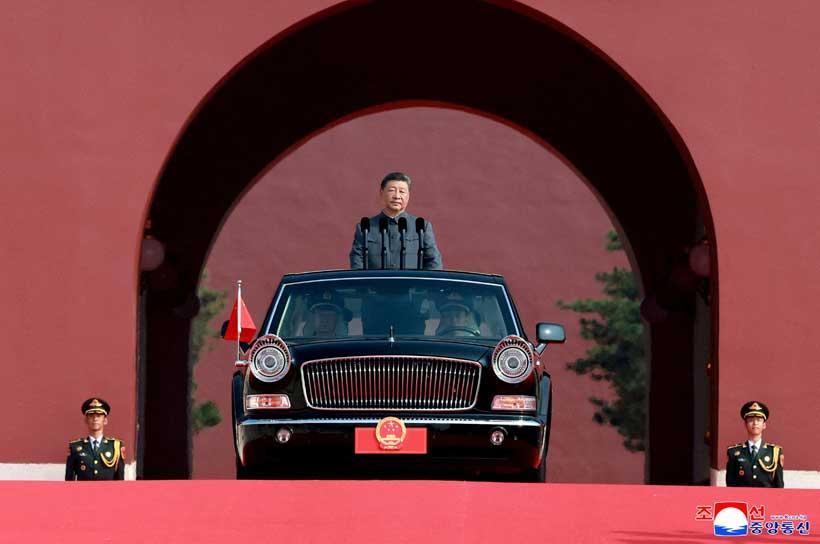By
Rameen Siddiqui
Africa-Press – Lesotho. For decades, the global order has rested on an unspoken assumption: that despite regional frictions, the United States and its allies established the fundamental rules of the game. Now a series of seemingly disparate events — a military parade in Beijing, an energy agreement in Siberia,and the spectacle of pariahs jetting into a secluded hideaway for the annual Asian equivalent of Davos — form a portrait of the greatest challenge since the Cold War to the philosophy that has underpinned American foreign policy for 40 years. A new axis of power doesn’t dawn: it is being created as boldly as possible which seeks to reshape the world in its own image. This is not a mere shift in the balance of power, but an attempt to create a parallel universe of political, economic and military influence.
The public spectacle in Tiananmen Square was a masterclass in this new geopolitical theater. China’s president, Xi Jinping, flanked by Vladimir Putin and Kim Jong Un, wasn’t merely commemorating a historical victory. He was unveiling a new alliance, one forged by a shared disdain for Western hegemony and a joint ambition to break its clamp off global affairs. The message delivered amidst a display of cutting-edge missiles and drones, was crystal clear: China’s rising power is no longer just for its own defense, but for the collective security of a counter-Western bloc.
Alliance without Allegiance
This is a coalition based on mutual need. For Russia, ostracized by the West for its war in Ukraine, Beijing offers a crucial lifeline. The newly signed “Power of Siberia 2” , a binding agreement that rivals Europe’s former dependence on Russian energy, is more than a commercial agreement; it is a strategic bond. It grants Moscow the reliable revenue needed to sustain its economy and its war effort, while offering China the energy security to power its industrial heartland. Beijing, in turn, gains immense leverage over a weakened Russia, positioning itself as the central pillar of the global energy landscape and quietly dismantling Western pressure campaigns.
For North Korea’s Kim Jong Un the rewards are less beneficial but no less significant. His presence at the Beijing parade was a rare moment of international legitimacy, a powerful signal that China and Russia accept its nuclear status. It is a stunning rebuke to decades of Western non-proliferation efforts, and a quiet endorsement that could embolden Pyongyang to further its nuclear ambitions.
Weaving a Coherent Tapestry of Influence
But the story goes beyond this core triumvirate. This is a part of the grander strategy non-Western unity. Analysts say Xi’s whirlwind of activity underscores China’s ambition to present itself as a reliable partner to developing nations on the global stage. China’s recent diplomatic overtures to powers like India at the Shanghai Cooperation Organization (SCO) summit or its growing economic ties with Indonesia are not isolated incidents; they are threads in a single coherent tapestry designed to draw powerful players out of the U.S. orbit. China is offering tangible advantages like investment opportunities and a new development bank, a major step forward for the SCO, which has expanded markedly to also include India, Pakistan and Iran.
“China’s message as a more reliable, stable alternative to the United States is resonating with large swathes of the world, particularly across Asia, which sees the United States as an increasingly belligerent force in world affairs,” said Eric Olander, editor-in-chief of the China-Global South Project. A lot of developing countries and middle-power states may still be a bit ambivalent about what China’s proposing with its new governance and development initiatives, but at least what China is talking about is forward-looking, which is crucial for economies with large populations of young people looking for better employment opportunities.” Beijing is methodically building a coalition of nations that are not necessarily aligned in ideology, but are united by a shared interest in a multipolar world—a world where they can chart their own course without fear of American sanctions, lectures on democracy, and dominance of the U.S. dollar.
The implications are tectonic. As this new bloc solidifies, it raises the specter of an accelerated arms race in the Indo-Pacific, forcing US allies like Japan and South Korea to accelerate their defense spending. It complicates strategic planning by linking European security (Russia’s war in Ukraine) to Asian flashpoints (Taiwan and the Korean peninsula). Most importantly, it is a long term erosion of the institutions and norms that have underpinned global stability for three quarters of a century. The Western led international order is not collapsing from the outside; it is being deliberately undermined from within, as a new, unified force coordinates to create its own parallel structures for finance, security and diplomacy. The question is no longer whether the US hegemony is challenged, but what kind of world will emerge when it is finally gone.
moderndiplomacy
For More News And Analysis About Lesotho Follow Africa-Press






